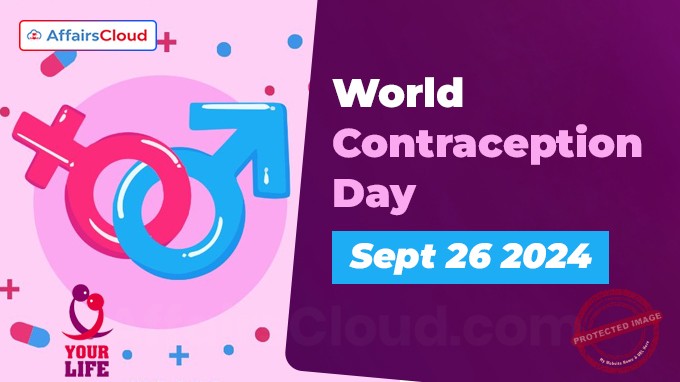 World Contraception Day is annually observed across the world on 26th September to improve awareness of all contraceptive methods available and enable young people to make informed choices on their sexual and reproductive health.
World Contraception Day is annually observed across the world on 26th September to improve awareness of all contraceptive methods available and enable young people to make informed choices on their sexual and reproductive health.
- 26th September 2024 marks the observance of the 18th World Contraception Day.
Theme:
The theme for World Contraception Day 2024 is “A Choice for all. Freedom to plan, power to choose.”
- The theme emphasises that every individual must be guaranteed the freedom to plan their family and to protect their reproductive health.
Background:
i.World Contraception Day was established by the 10 International Family Planning Organizations to highlight the significance of contraceptive measures as informed choices in family planning.
ii.The first-ever World Contraception Day was observed on 26th September 2007.
iii.The day is supported by the medical and scientific communities, government organizations and Non-governmental organizations for providing knowledge about how to protect sexual and reproductive health and how to prevent pregnancy.
What is Contraception?
Contraception is way of preventing pregnancy with the use of medicines, devices or through surgery. It is also known as birth prevention.
Types of Contraception
There are many types of contraception, some of them are reversible while others are permanent-
- Barrier Methods (condoms, sponges, diaphragms and cervical caps)
- Sterilization (surgical removal)
- Hormonal Methods (pills, patch, vaginal ring)
- Intrauterine Devices, IUD (Implantation)
- Emergency Methods
Key Points:
i.Access to contraception is essential to help in reducing adolescent births and to prevent maternal deaths. It is essential to bodily autonomy and to achieving gender equality.
ii.According to the United Nations Population Fund (UNFPA) nearly 257 million women worldwide are unable to meet their need for modern contraception, which increases their vulnerability to sexually transmitted infections such as HIV (Human Immunodeficiency Virus), unintended pregnancy, unsafe abortion and preventable maternal death.




